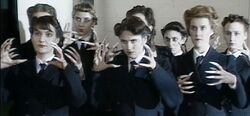Haemovore: Difference between revisions
m (enforcing T:CLEAN CODE) |
|||
| Line 42: | Line 42: | ||
{{season 26 aliens}} | {{season 26 aliens}} | ||
[[Category:Haemovores| *]] | [[Category:Haemovores| *]] | ||
Revision as of 21:58, 28 November 2011
The Haemovores, or Homo haemovorax were a species of vampire-like creatures that served Fenric.
Biology
Haemovores were a species of vampire-like humanoids who evolved from humans. They fed on the blood of humans, though they could also survive in sea water, which had a similar salt content.
The Haemovores had enormous strength and power. They could climb sheer surfaces with ease. They were resistant to bullets and could only be killed by a stake to the heart. Haemovores had razor-sharp claws which they used to kill people. Haemovores could weld metal with their hands and older Haemovores built up armour made of metal they collected and melted together. The Haemovores could be stopped with a psychic barrier, which in humans was created by the mental processes associated with strong faith; the Doctor (and, presumably, other Time Lords and psychically-aware beings) could create this barrier at will. In the presence of the barrier they often responded with ear-splitting shrieks.
- Haemovores were known to only hunt in the fog or mist. Whether they created this fog themselves or simply hunted when the time was right is unknown.
The Haemovores communicated with each other telepathically. This could be detected by telepathic humans. They could also telepathically control humans, making them easier to feed on. They were all controlled by Ingiger, who could kill them with a thought. (DWN: The Curse of Fenric)
Life cycle
The Haemovores started life as humans, who were changed by other Haemovores. At first, the only signs of change were pale skin, large red lips and sharp claws. They still had their minds and memories, but a more feral mindset. As they aged, their appearance started to change. Their skin grew slimy and wrinkled, their eyes were swollen shut and their mouths turned into suckers for feeding. After a century, they weree completely transformed into Haemovores.
After being killed, they would rapidly decay into charred bones and slime. (DWN: The Curse of Fenric)
History
The Haemovores evolved on Earth in circa 500,000 AD, after the planet was ruined by industrial waste. The last Haemovore was Ingiger, who believed himself the last living creature on Earth. Fenric brought Ingiger back in time to Transylvania some time after the 10th century, where he fed on the Vikings who had taken the flask containing Fenric. He and the Haemovores followed them, and after they were killed by the pirate Hemming, followed him to Maiden's Bay.
Though Hemming and all his men were killed by the Haemovores, Hemming had buried the flask beneath St. Jude's Church where they could not get it. Instead, the Haemovores were forced to wait.
In the mid 19th century, a girl was fed on by the Haemovores of Maiden's Point. This story would be told to Bram Stoker. It would be part of the inspiration of the story of Dracula.
In 1942, a squadron of Soviet soldiers were sent into Nazi-controlled Romania. All but one man was killed by Haemovores, though he was mentally scarred by the experience.
Captain Sorin and Sergeant Trofimov were sent in with a rescue team, though they were only able to find the one survivor. (DWN: The Curse of Fenric)
Six months later, the Haemovores in Maiden’s Bay were awoken by Fenric to attack the Soviet and British soldiers as part of a trap to defeat the Seventh Doctor. Once they had served their purpose in this plan, Fenric ordered Ingiger to kill the Haemovores with a thought. the poisons made by the nearby base, Fenric intended to pollute the world, causing the future that created the Haemovores. The Doctor was able to convince Ingiger to betray Fenric; the Ancient One killed both itself and Fenric by going into the isolation chamber with Fenric and releasing a poison. (DW: The Curse of Fenric)
- The creation of the Haemovores is a predestination paradox. After the Doctor's defeat of Fenric, this future may not still exist.
| ||||||||||||||

